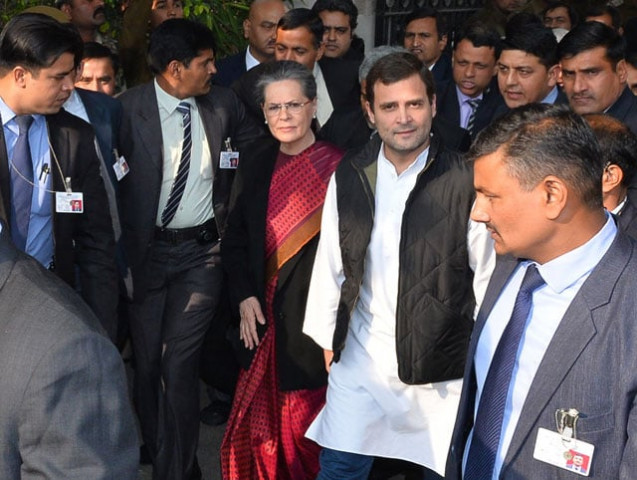Indian court grants bail to Sonia, Rahul Gandhi in graft case
After proceedings of 20 minutes, the bail was granted on a personal bond of INR 50,000 each, says lawyer

Vice-President of India's Congress Party Rahul Gandhi (2R) walks with his mother and party President Sonia Gandhi (C) and officials as they leave Patiala House Court in New Delhi on December 19, 2015, after a court appearance by the pair. PHOTO: AFP
The Congress party leaders, scions of India's famous Gandhi-Nehru dynasty, arrived at the Patiala trial court waving to their supporters as hundreds of police and paramilitaries stood guard outside.
"Bail was granted, the matter stands adjourned until February 20," defence lawyer RS Cheema, who was inside the courtroom, told reporters.
After brief proceedings a magistrate granted the mother-son duo bail without conditions on a personal bond of INR 50,000 ($754) each, the lawyer said.
Sonia's daughter Priyanka Gandhi and former defence minister AK Antony provided sureties, the lawyer said. Three others accused in the case were also granted bail.
India's ruling party confronts Gandhis as parliament gathers
The Gandhis were summoned by the court after a politician from the ruling Bharatiya Janata Party (BJP) filed a private criminal complaint accusing them of misappropriating assets of the now-defunct National Herald.
They fiercely deny Subramanian Swamy's allegations and accuse Prime Minister Narendra Modi of waging a political vendetta against them and their embattled party, which has been struggling since a bitter electoral defeat last year.
"I have no doubt that the truth will come out. We are well aware of the campaign of attacks and criticism that our political rivals follow," Sonia Gandhi said at a press conference following the hearing.
 President of India's Congress Party Sonia Gandhi gestures as she addresses a media briefing with former Indian Prime Minister Manmohan Singh (L) inside All India Congress Committee (AICC) headquarters in New Delhi on December 19, 2015, after a court appearance by her and Rahul Gandhi. PHOTO: AFP
President of India's Congress Party Sonia Gandhi gestures as she addresses a media briefing with former Indian Prime Minister Manmohan Singh (L) inside All India Congress Committee (AICC) headquarters in New Delhi on December 19, 2015, after a court appearance by her and Rahul Gandhi. PHOTO: AFP"They are targeting us and making full use of the state agencies," she said.
It followed a tumultuous week in Indian politics which saw members of the embattled Congress and their allies throw parliament into chaos several times in protest at the case.
The intensely bitter spat between the parties looks set to stall the progress of a landmark sales tax reform in parliament.
Separately, Modi clashed with Delhi chief minister Arvind Kejriwal, head of the anti-corruption Aam Aadmi Party (AAP) after federal investigators searched the city administration's headquarters, with Kejriwal branding the premier a "psychopath".
The AAP in turn caused a storm by accusing Finance Minister Arun Jaitley of presiding over financial irregularities when he controlled the capital's cricket association -- a claim he vehemently denies.
Swamy first filed the case against the Congress bosses in 2001.
Congress — the Gandhis’ personal fiefdom
He accused them of illegally acquiring the now-defunct newspaper's assets after buying its publisher through a new private company, Young Indian, using a loan from party funds.
He alleged that the Gandhis aimed to grab property worth $332 million owned by the publishing firm, Associated Journals, using fraudulent papers.
Both Gandhis are directors of Young Indian, owning a 76-percent stake in it and the remaining shares.
Sonia and Rahul were first summoned in the case in June 2014, based on a complaint by Swamy but refused to appear in court in person, sending their lawyers instead.
On December 7 the Delhi High Court turned down a plea by the Gandhis to quash the latest summons and exempt them from appearing in person.
The National Herald was founded by Jawaharlal Nehru who went on to become India's first prime minister.
It first published from the northern city of Lucknow in 1938 and played a prominent role promoting nationalist sentiment before India's independence from Britain in 1947.
Sonia Gandhi, widow of Nehru's grandson Rajiv, later became the chief patron of the trust that ran it.
But dogged by bad management, poor circulation and falling revenue, she finally decided to close the publication in 2008.



















COMMENTS
Comments are moderated and generally will be posted if they are on-topic and not abusive.
For more information, please see our Comments FAQ